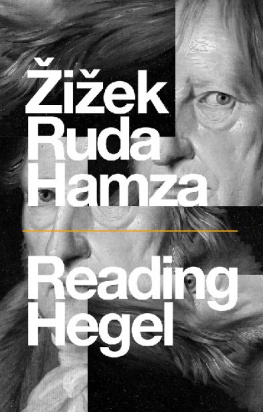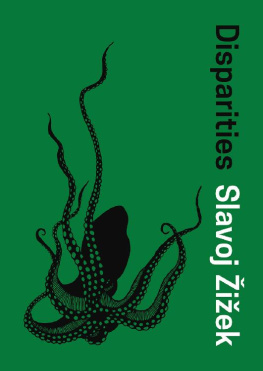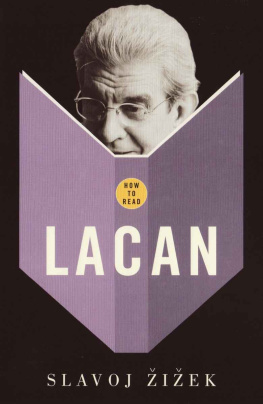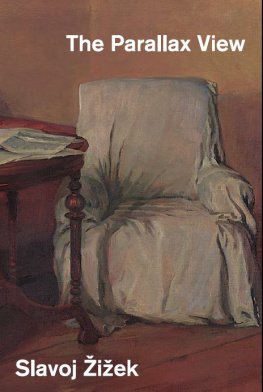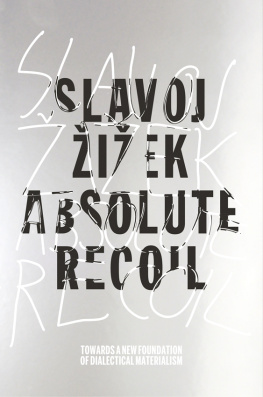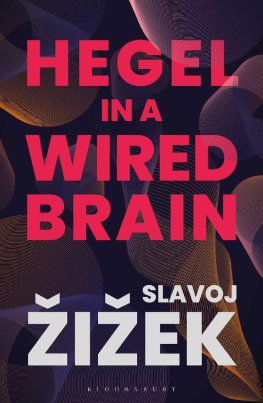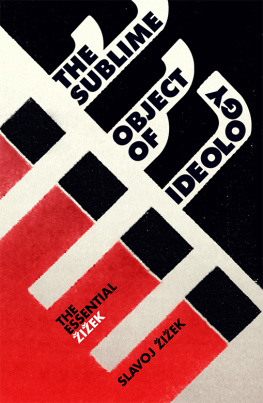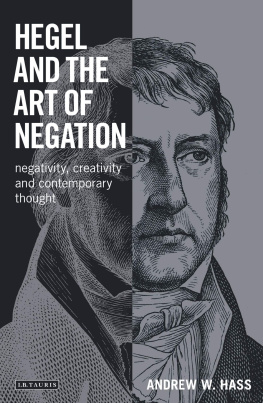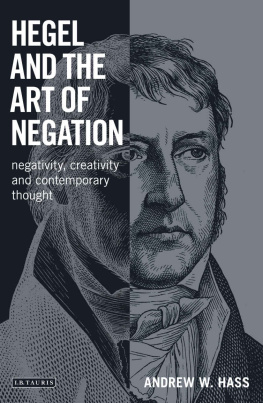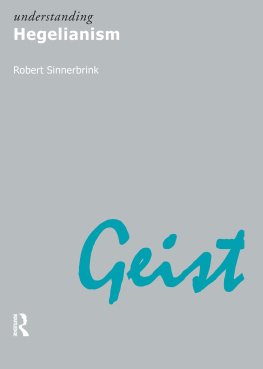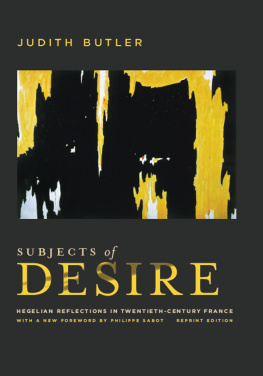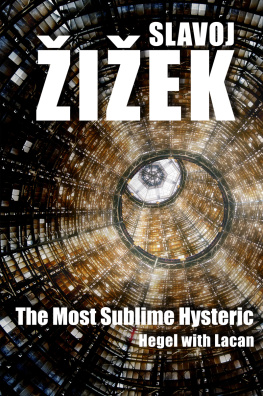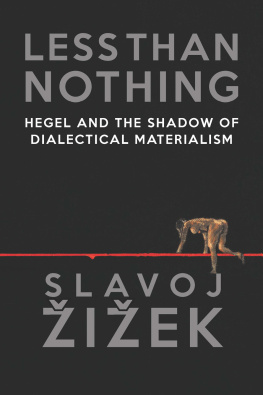Copyright Slavoj iek, Frank Ruda, and Agon Hamza 2022
The right of Slavoj iek, Frank Ruda, and Agon Hamza to be identified as Authors of this Work has been asserted in accordance with the UK Copyright, Designs and Patents Act 1988.
First published in 2022 by Polity Press
Polity Press
65 Bridge Street
Cambridge CB2 1UR, UK
Polity Press
101 Station Landing
Suite 300
Medford, MA 02155, USA
All rights reserved. Except for the quotation of short passages for the purpose of criticism and review, no part of this publication may be reproduced, stored in a retrieval system or transmitted, in any form or by any means, electronic, mechanical, photocopying, recording or otherwise, without the prior permission of the publisher.
ISBN-13: 978-1-5095-4591-9
A catalogue record for this book is available from the British Library.
Library of Congress Control Number: 2021939021
The publisher has used its best endeavors to ensure that the URLs for external websites referred to in this book are correct and active at the time of going to press. However, the publisher has no responsibility for the websites and can make no guarantee that a site will remain live or that the content is or will remain appropriate.
Every effort has been made to trace all copyright holders, but if any have been overlooked the publisher will be pleased to include any necessary credits in any subsequent reprint or edition.
For further information on Polity, visit our website: politybooks.com
Introduction
According to Marxs famous saying, Hegel remarks somewhere that all great world-historic facts and personages appear, so to speak, twice. He forgot to add: the first time as tragedy, the second time as farce. Displacing this well-known quip, if only a bit, we might ask: Does this also hold for world-historic personages and facts in and of philosophy? Could one read Hegels philosophy itself as the first, the tragic event? Such a reading would in some respects not be entirely alien to a certain phase in the reception of Hegels thought in general. Many of his readers have asserted that he can and must be considered an essentially tragic thinker one may here just in passing refer to the famous tragedy in ethical life which is often taken to provide a paradigmatic articulation not only of the constitution of the Greek, but also of modern political life and ethical communities, despite this view being repeatedly contested. However, if for the sake of following this hypothesis Hegel represents the tragic event, not only of ethical life, but also of modern philosophy in general, where and how do we locate its repetition in the form of the farce? Where are we to find Hegels inverted twin?
There is certainly a farcical dimension to the immediate aftermath of Hegels thought. This is already the case, because (some of) his pupils prepared and published an edition of his works that became highly influential to most of his subsequent readers, and which consequently led, to some degree, to profound confusion about the true kernel and thrust of Hegels philosophical system, and by adding comments and annotations that were taken to be his very own wording generated a peculiar struggle about Hegels ultimate achievements (and failures). Surprisingly material from this edition was nonetheless able to become, for long, the main reference for reading Hegel a sort of manifestation of the Deckerinnerung , the screen memory that overshadows what one perceives to be Hegels ultimate philosophical system. However, the immediate Hegelian aftermath also already inaugurated, among other things, the infamous split between the young and the old Hegelians, which seemed to practically and farcically enact Hegels own claim that any immediate unity (and thus also that of the Hegelianism and of Hegel himself) will need to undergo processes of alienation and division to, at least possibly, reinstate the original unity in a reflected form. Does Hegels ultimate tragedy, in both senses of the term, lie in the fact that immediately after his death his philosophy was not only dissected and rebutted, but there was also a farcical element in the defense of a Hegel that was articulated in words he never wrote against critics who got it all wrong? So, did the farce not simply prove the tragedy to be a real tragedy? One could also, in both enlarging the historical focus and in locating the ultimate embodiment of the repetition of Hegels tragedy as farce, identify the tragedy of Hegels oeuvre with the fact that the arguably most influential and important pupil of the thinker who was by many perceived to have been a Prussian state philosopher (Hegel), has been one of the most influential and famous contenders of revolution and of overthrowing the state, namely Marx. May then not Marxs ultimate Hegelian heritage again confirming the tragedyfarce sequence be identified in the fact that he himself not only witnessed as many rebuttals as Hegel, but was actually often claimed to have been the one who put (revolutionary) dialectic into practice, and thereby refuted it even more harshly, due to the brutal and bloody outcomes of his thought when concretely realized?
The move from tragedy to farce then happens first as tragedy, then as farce that becomes again, a tragedy of its own, and then repeats as a (bloody) farce Whatever historical frame one likes to posit, today neither Marx nor Hegel are, and maybe surprisingly, thinkers who are generally and overall considered to be indefensible any more. Both have become widely accepted (rather than merely tolerated) within the universities and even within the wider outskirts of academia. There are journals dedicated to both, conferences held around the world on a regular basis that deepen and perpetuate the already existing immense scholarship. Numerous books are regularly published on their work and editions of their writings that demonstrate high philological quality have been prepared during recent years. They have almost created their own branches of the academic industry and have certainly become proper objects of academic study. At first sight, it might seem surprising that this holds for both Hegel and Marx. It might seem given the political history linked to their names especially astounding that this also happened to Marx. And one might be tempted to assume that he was after all too farcical (in all the brutal aspects of the farce) to be integrated into and assimilated within academic discourse, even if simply because it is mainly the discourse of state institutions (one of the reasons why Lacan called it discourse of the university). Was Marx not the anti-statist thinker par excellence and Hegel the ultimate thinker of the (Prussian) state?
One ought not to forget and thus must acknowledge that already in the last century there have been more institutions devoted to the study of Marx (and Engels) and of historical and dialectical materialism than there have ever been for (the arch idealist) Hegel. Surprising as it may be, it has proven for very different reasons more difficult to assimilate and integrate Hegel into academia, and this is the case, even though he was deemed to have been a state philosopher in all senses of the term (and Marx did not manage to find a proper job in any institution) and not at all the paradigmatic thinker of revolution. There seemed (and maybe still seems) to be something in Hegels thought that was nonetheless a too bitter pill, too hard, too big to swallow, too much to assimilate for, at least, academia. Maybe it is just too difficult to swallow a system that swallows everything as he was often criticized for having. A symptom of this may be, as everyone knows, that Hegel was for a long time and especially in the last century considered to be the incarnation of the worst kind of philosophy possible. This was, at least partially, because he was one of the very few thinkers who one could find within the history of philosophy who did not announce and inaugurate a renewal of philosophical thought. He was radical in claiming that he brought to the end what had begun long before him. Hegel was thus considered the worst, since he was considered a thinker not allowing for, not conceiving of novelty or transformation. This was paradoxically but symptomatically identified to manifest in him declaring the end of philosophy (in his own philosophy); but he also declared the end of art, politics, religion, history, and thus all human practices. All this was read as if the end would not change anything. Hegel was the worst philosophy could get, because he ended (and as he phrased it himself: completed) it. He sublated, however precisely this term is to be understood, everything into a final form of knowledge that worse comes to worst he seems to have called Absolute Knowing.

